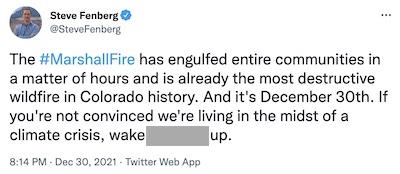
Source: Twitter
I won’t disagree. I hope 2022 is a year of powerful change, in our hearts and minds as well as in the transportation, energy, and building sectors. I’ve been wondering about change lately. Change is stressful, but we need to overhaul much of our economy and infrastructure in the next few decades. That means that our kids will likely be facing a lifetime of change.
How do we teach them, or ourselves, to prepare for that? We will change how we fuel up our cars, what we put on our plates, how we heat our homes, how often we fly, whether we reuse or buy new, how we use and value land, what jobs we have, and how we work. How do we think about that constant shifting without feeling unmoored?
There is an interesting discussion about change in the Netflix movie “The Two Popes,” a fictionalized account of some conversations between Pope Benedict XVI and Cardinal Bergoglio (who later became Pope Francis). Cardinal Bergoglio is talking with the more conservative Pope Benedict about the evolution of his views away from orthodoxy.

Source: Netflix’s The Two Popes
Are we worrying about the wrong changes? Should we change how we think about change? For the last two years we have been asked to wear masks, limit gatherings, and work remotely. In the coming years will be asked to switch to EVs or ebikes and to adopt heat pumps. We will use more second-hand items, fly less overseas, and eat less meat. We will find new ways to save more energy and to waste less food. In one sense, it’s a lot of change, on-going change. On the other hand, it’s a small amount of change in the much bigger service of maintaining our values -- keeping ourselves and our community healthy; limiting ecological disasters; and generally keeping the planet habitable for life around the globe.
Instead of focusing on what is changing, would it be better to focus on what is staying the same, namely our core values, our health, our home? It’s not about being progressive or being conservative. It is about keeping these fundamentals intact, not only for ourselves but for others. It’s not a story of change, but a story of conservation. We change small things to preserve big things.
I’d go one step further and suggest that for extra credit we be grateful for our ability to make these changes. Otherwise where would we be? Aren’t we lucky to have had masks and vaccines to use, that we have EV and heat pump options, that we can modify our diets to reduce emissions? What if we didn't and couldn’t? Shouldn’t we be celebrating our luck rather than resenting the needed change?
Maybe that’s too Pollyanna, but I think our perspective is off and that is hurting us. I know in my case it took me years (literally) to start using a compost bin and to get my head around the idea of driving an EV. But once I made those changes I quickly got used to them. It’s uncomfortable for me now to throw food scraps in the trash, and I just don’t like driving a gas car. Moreover, getting those changes under my belt has made it easier for me to try more things. Small victory: I finally tried cooking with oat milk this past week. (What better occasion than to experiment on your family over the holiday?) I served chocolate pudding made with oat milk, which was delicious, and I also made a quiche with oat milk that tasted entirely normal to me. These are baby steps, but over time they will turn into bigger steps.
Do you think a new perspective on change would make a difference? If you do have climate-related changes in mind for this year, what inspired you? I’d love to hear.
Notes and References
0. Kudos to reader Peter from Daly City who sent me pix of his new electric space and water heating, to reader Sonya of Redwood City who is contractor-shopping for a mini-split in her home, and to reader Hong-Ha of Palo Alto who loves her new HPWH. Your efforts are inspiring!
1. The day after I posted this I saw this essay in ProPublica about on-going wildfires in California. It is also partly about how to think about change. It's not an easy read, but I recommend it.
Current Climate Data (November 2021)
Global impacts, US impacts, CO2 metric, Climate dashboard
Comment Guidelines
I hope that your contributions will be an important part of this blog. To keep the discussion productive, please adhere to these guidelines or your comment may be moderated:
- Avoid disrespectful, disparaging, snide, angry, or ad hominem comments.
- Stay fact-based and refer to reputable sources.
- Stay on topic.
- In general, maintain this as a welcoming space for all readers.
Comments that are written in batches by people/bots from far outside of this community are being removed.




